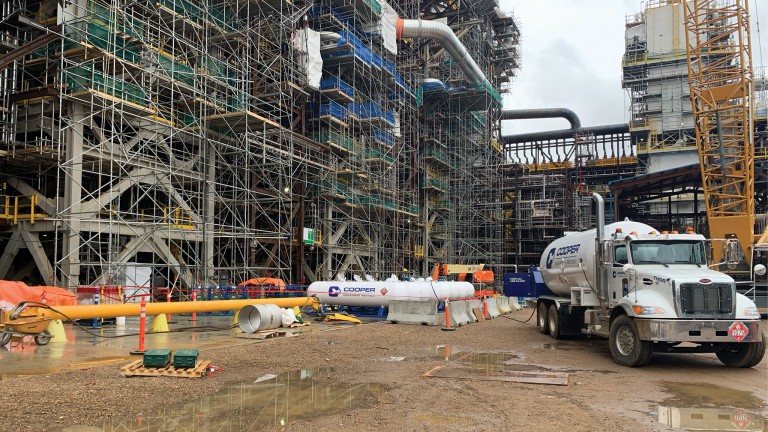Propane’s naturally odourless, non-toxic, and low combustion qualities make it safer than diesel or gas-powered engines.
Cooper Equipment Rentals
Operational benefits make propane a great fuel source when used safely
The use of propane-powered heating equipment can help ensure projects finish on time and on budget. When it comes to the comfort and safety of workers, propane-powered heaters are also better at maintaining the ambient temperatures necessary for tasks like drywall or cement installation. No one holds budget to replace drywall or fix cracks in concrete that result from incorrect ambient temperatures. With new advancements in heat monitoring technology, contractors can also receive notifications for even the slightest change in temperature or humidity.
When it comes to safety, real-time monitoring can help with that too. Overheating is one of the most common winter hazards — especially in areas with a lot of combustible materials. On the other hand, lack of heat in the winter months can also be detrimental to your workers’ safety and productivity. We are also seeing regulatory bodies setting specific heating standards at construction sites to protect materials and ensure worker safety in the event of an incident.
Do you know how to safely integrate propane into your fuel mix?
Propane can efficiently fuel your power generators and other equipment — all while lowering emissions and saving money, making it easier to finish projects safely on time and on budget. Since emissions regulations are getting stricter (especially for indoors and in residential areas) propane’s naturally odourless, non-toxic, and low combustion qualities make it safer than diesel or gas-powered engines. At Cooper Equipment Rentals, we are seeing an increased investment in propane-powered generators to heat office trailers, thaw grounds, and heat job sites since they are quieter, cleaner, and more cost-effective than diesel generators.
We’re also seeing propane-powered scissor lifts, forklifts, and telescoping booms that are as reliable as diesel and gas-powered equipment but with lower fuel costs. The fuel savings goes far beyond the day-to-day fuel costs as propane-powered equipment is also typically less expensive to rent and has lower maintenance costs over its lifetime.
Education and training cannot be overlooked
Propane is gas under pressure and can pose a significant danger when cylinders are being transported, stored, and connected, or when people are working in areas with propane heaters and torches. Workers must know and follow the correct propane safety regulations. They must know how to identify a propane leak and understand the importance of keeping propane containers away from ignition sources, combustible materials, air intakes, and building structures. They should also be aware that propane tanks should never be below grade or near open excavations. Direct-fired heaters like propane have a low risk when used properly, but when placed next to combustible materials, they can be a serious fire hazard. They also have the added risks of releasing hazardous gases such as carbon monoxide, which is especially dangerous in areas that lack proper ventilation. Some people cannot smell the chemical mercaptan that is added to propane — so those workers need to be especially vigilant.
Liquid propane is tied into a vapourizer and must be handled by a qualified gasfitter, so it’s important to know when to engage these individuals. Every propane supplier is governed by the Canadian gas code with dedicated procedures in place to support customers while ensuring crews are trained to work with this fuel source.
Read the full article here

